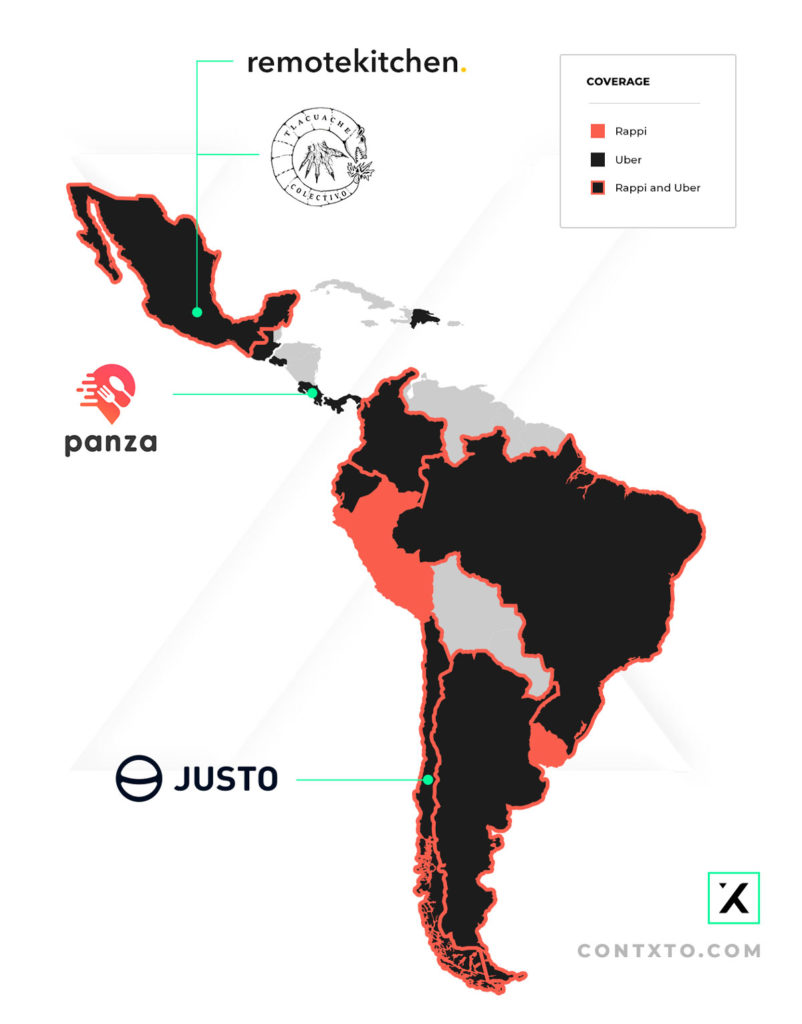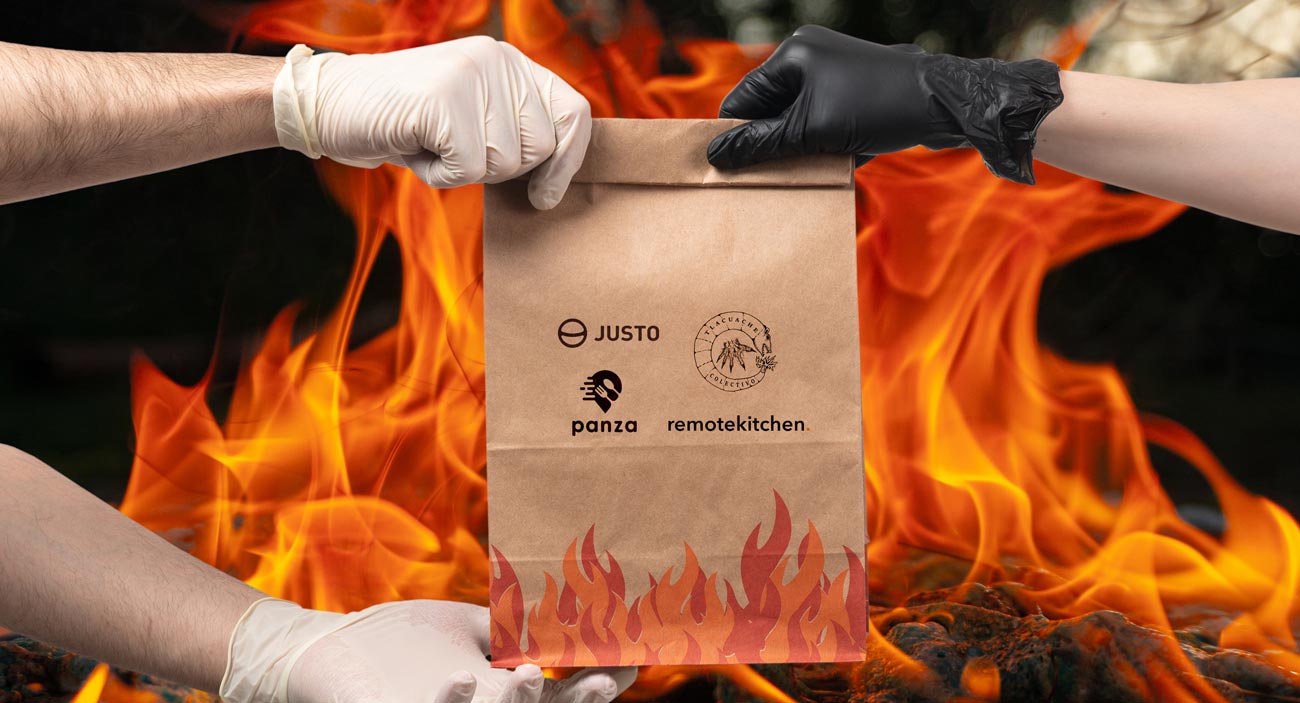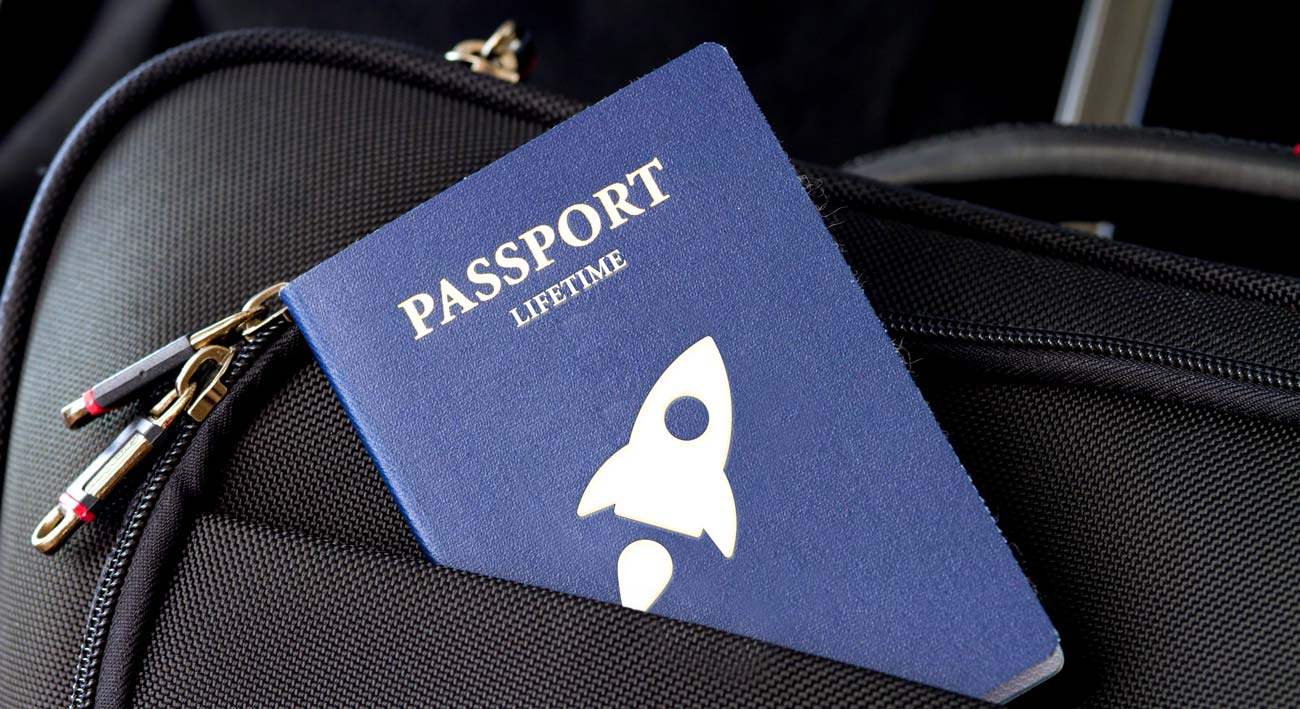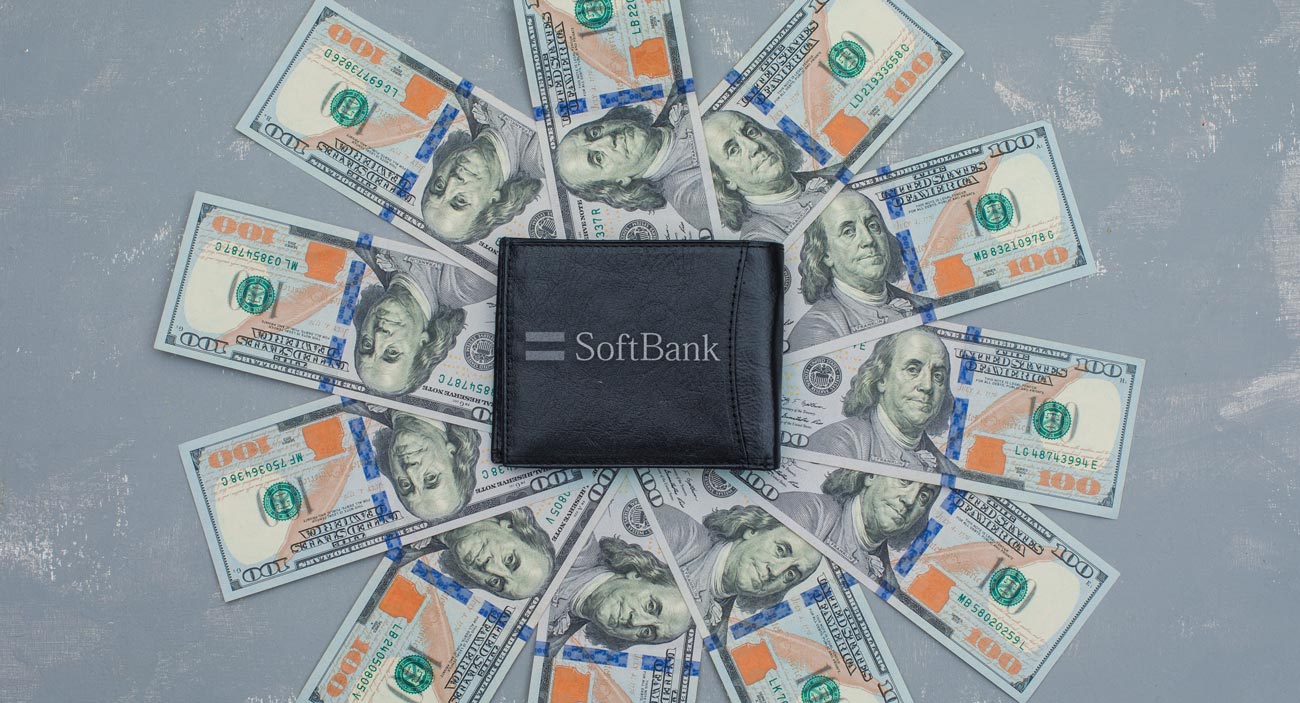Welcome to our new The Exclusive deep dive content about our Latin American ecosystem. We’re giving our registered newsletter users a sneak-peek of these soon-to-be paid for articles.
(function() { var qs,js,q,s,d=document, gi=d.getElementById, ce=d.createElement, gt=d.getElementsByTagName, id=”typef_orm”, b=”https://embed.typeform.com/”; if(!gi.call(d,id)) { js=ce.call(d,”script”); js.id=id; js.src=b+”embed.js”; q=gt.call(d,”script”)[0]; q.parentNode.insertBefore(js,q) } })()
Contxto – Covid-19 made restaurants real sick—of established last-mile delivery options. Now, in a bid to cut out the middle-app, restaurants and tech are banding together across Latin America to get their food to their customers without having to pay hefty commissions.
The trend can be seen through a diversity of approaches. There’s the rise of:
- Pure tech apps switching to help out their local communities
- Charities looking to give budding restaurateurs a chance to start a business; and
- Community alliances looking to become successful and sustainable startups in the near future.
The catch is whether these contenders’ tech and business models are suited to facing some of the most powerful delivery companies in the world.
Contxto has covered a myriad of these novel last-mile delivery solutions for restaurants, but four of the most distinctive come to mind.

Panza from Costa Rica
A team of three entrepreneurs initially focused on the tourism industry pivoted to develop an app to support local chefs in Costa Rica. Panza—a non-profit organization… for now—caters to people who lost their restaurants due to the pandemic or who don’t have the resources to start their own business. Their idea was:
- To offer them the platform/market to connect with the users who buy their food, and
- To work with them directly to become entrepreneurs
The idea is to directly support the local community: People passionate about preparing amazing food from home, but who do not have the resources to open a business. Panza allows them to do so by providing educational, technical (financial and legal guidance), and even financial resources where possible.
Operational model: Small overheads before the big jump
Regarding the UI of the app, Panza has received positive responses. However, they want to make it very clear to users that their app is a work in progress.
We tell them when they open the app, that we are working to improve it. We didn’t rush the launch because we wanted to have a solid product. Testing and correcting errors is more important to us than launching an invalid product.
Ruby Gleber, Co-Founder at Panza
However, beyond this beta testing phase, what seems most interesting about Panza’s model is how they are actively stimulating their market on the supply side. As a temporary non-profit, they are plugging much of their capital—human and otherwise—into helping folks start the restaurant that will eventually cater to their customer base.
This is a long-winded process due to regulatory reasons. Panza has been working with municipalities to follow patent and permit guidelines to serve and sell food. Then, all of their cooks must pass a trial period of three months before obtaining their licenses. Once a cook is verified, Panza will add a symbol to their profile in the app.
Financial model: Eyeballs first
Panza considers itself to be an “eyeballs first” company. This is quite common in the startup world and means that they are focused on growth, rather than revenue at first.
The idea is that once usage becomes consistent, they will then introduce their revenue model to their customer base.
However, the only reason this is possible is that Panza has “zero overheads right now; zero recurring costs and no money invested in marketing, operations, nor development.” All three co-Founders work without compensation.
Our vision is long-term, so revenue is not the priority at the moment. We will also implement a verification program for users and chefs that will be a paid service.
Ruby Gleber, Co-Founder at Panza
But, how will the model work once the revenue strategy kicks in?
After polishing up this phase of testing and adoption as a non-profit, Panza will include features offering delivery and payment processing services. All of this will continue to work on a hybrid, part free to use, half paid basis—a freemium model.
As strange as it may sound, this revenue-free phase is the easy bit. Clearly, the co-Founders will have to make a living someday, but for now, they can concentrate on making the best product that they can create.
However, I foresee two future challenges that Panza will have to overcome:
- Revenue creation incurs opportunity costs. Suddenly the Founders will find themselves immersed in far more bureaucratic and technical issues. They might have to start hiring accountants, lawyers, and other services, increasing their overheads.
- And this is where I worry most: Overheads are like barnacles on a ship. They feel small at first but, as they multiply, they can cause drag. To offer future pay-to-play solutions like a delivery sounds alarm bells to anyone acquainted with the treacherous world of last-mile B2C logistics.
Nevertheless, my worries are somewhat assuaged by Panza’s localist idea of logistics:
When we add the delivery service, we will look to offer employment to the local community. Deliveries are never more than a couple of miles, because we are neighborhood based.
Ruby Gleber, Co-Founder at Panza
Justo from Chile
Perhaps the most established solution to this list, Justo’s offer is still rather radical. The startup doesn’t operate as a logistics service per se. Rather it provides restaurants with a website, an electronic payments system, marketing services, and even on-demand delivery.
Simply put, it gives restaurants an online presence but doesn’t charge them over every sale, nor does it hoard their customers’ data.
The do-good, feel-good approach has worked. Nowadays, Justo can boast about being a Y Combinator alumnus.
Operational model: Equal and opposite reaction
Justo has done last-mile scaling well. The Chilean company can now also be found distributing restaurants in Mexico. The company grew by 500 percent within its first year of operations giving credit to their claims to be the “anti-Rappi”.
The key to Justo’s model is differing customer focus as compared to Rappi and UberEats. While the latter see the final consumer of the food as the chief customer to cater to, Justo focuses on the restaurants as their primary customers.
Simply put, this startup gives restaurants an online presence but doesn’t charge them over every sale, nor does it hoard their data. This relationship shifts the way that restaurateurs see the app and increases its demand of those who supply the food. And you can see it in terms of adoption:
Since its founding, in its native country, Justo has grown from an initial 220 businesses using its services to its current 5,000. That’s a 15 percent market share Justo holds just within Chile.
Financial model: The challenge of just scaling
No doubt, Justo is what the likes of Panza are looking at as inspiration.
The Chilean startup doesn’t operate as a logistics service per se. Rather they provide restaurants with a website, an electronic payments system, marketing services, and even on-demand delivery.
However, as we’ve explored in detail in Contxto’s deep dive into what massive expansion meant for Gympass’ corporate culture, Justo has a difficult challenge ahead. A company like Rappi, up until recently with its “Propio” service, has not deliberately linked its brand to fairness to restaurants. Justo has—justice is in the name!.
Thus, as it grows, its ethical ethos will start to inevitably rub up against the practical effects of scaling. Of course, technology can help—as we have seen with a similar model with Mexico’s local, ethical, and fast expanding produce distributor, Orchata—.
Yet, the question stands: Is there a point where you become so massive that you inevitably have to compromise part of your feel-good standards?
Colectivo Tlacuache in Mexico
Colectivo Tlacuache was formed from a pure tech solution known as Plataforma. It was an integration platform originally designed for the retail sector.
Yet the pandemic moved Plataforma to splinter into a version that caters to the restaurant industry. Initially, Colectivo Tlacuache was launched as an act of goodwill towards the co-Founders’ chef friends and favorite lunch spots. Yet, it quickly became an established food delivery solution as an economic alternative to the last-mile establishment.
Operational model: High-end last-mile fast-response
If last-mile delivery were a cottage industry, this Tlacuache Collective would be it. They were the fast response unit to the pandemic; Plataforma deployed their platform quickly as their restaurateur friends foundered.
Tlacuache didn’t provide an app. They set up a website where you could order your food. They didn’t hire a logistics company either; they got the staff to wait people’s homes instead of their tables. They didn’t think of scaling; they catered simply to a handful of high-end Mexico City restaurants that had scoffed even the idea of home-delivery.
Tlacuache had very good momentum at the beginning. They had cornered a very niche market.
However, as people started to wander out, the platform’s growth stalled and use stabilized. Platafroma’s Founders now say that the past couple of months have been much slower than at the beginning.
Yet, although they anticipate that October/November will potentially see another lockdown—following in the footsteps of the likes of Spain—, Tlacuache is not putting all its eggs into the last-mile basket.
Financial model: Beta boosting
Collectivo Tlacuache is the ultimate beta test for Plataforma.
Indeed, their plan is to plug in the know-how and capital they are getting from Tlacuache into further developing the tech behind Plataforma throughout September.
We want to have a more complete product, so that restaurants can charge on the platform and enable a dashboard for their products alongside inventory control.
All of this development will be completely transferrable whenever Plataforma feels ready to hit its initial target marketing; retail and beyond.
That is where the true scaling will begin.
remotekitchen in Mexico
Meanwhile, and also hailing from Mexico City, remotekitchen’s solution looks to ride the pandemic to fully digitalize the restaurant supply chain, facilitating processes for both owners and customers.
This Mexican dark kitchen enables restaurant owners to run their businesses using nothing but their smartphone. They can thus communicate with customers, receive orders, promote the restaurant, and even process payments.
Operational model: Bringing restaurants into the dark
Starting as a dark kitchen itself, remotekitchen saw the pressure that the pandemic was putting on its own business and saw a golden opportunity.
It quickly pivoted onto a fully digital solution to offer its dark services to previously non-dark kitchens. This is how the startup began to offer a Saas (Software as a Service) fixed-cost solution, so that restaurants could scale their orders without worrying about scaling costs.
Financial model: Distributed distribution
In a sense, remotekitchen has fused the Panza and Tlacuache models. Indeed, the latter startup’s co-Founders cite remotekitchen as a solution they are keeping an eye on.
On the one hand, like Tlacuache, remotekitchen provides restaurants digital infrastructure like a website and an orders platform, as well as promotional material.
On the other hand, like Panza, they work on the freemium model, where restaurants can get the added benefit of a payments platform.
What’s distinctive about this particular solution is that it is not promising delivery. Somewhat misleadingly their website features a picture of a courier with a last-mile delivery backpack on. But, look closely, and you’ll see he’s on a rented Mobike and has what seems to be like a SinDelantal-style backpack on.
Here, the business model red flags start to wave for the opposite reason as compared to Panza. Where the Costa Rican app wants to promise last-mile delivery options at some point; remotekitchen seems to be tethering into existing infrastructure.
Indeed, it’s interesting that Mobike would feature in one of their photos since, specifically in Mexico City, this micro-mobility company has been having its own set of issues with the government and the pandemic.
It is the eternal dilemma: Set up a comprehensive solution and risk crashing your startup for overreaching. Yet, don’t set up a comprehensive solution, and you put yourself at the mercy of forces beyond your control.
It’s a bit like with social media-driven solutions: Every time Facebook changes its algorithm a startup’s stats crash. So could be the fate of last-mile delivery systems that don’t do the last-mile themselves.
The mother of all invention
So, there you have it. Four different approaches with a common goal triggered by a common event: the Covid-19 lockdowns.
Before the pandemic, over 90 percent of independent restaurants in Latin America were not online at all. That had to change, and fast, yet what was interesting was the diversity of options that emerged.
One would assume most restaurants would reach out to the usual last-mile delivery suspects. Rappi, UberEats, SinDelantal, Domicilios.com. All established solutions with widespread coverage and years in the business.
Yet, perhaps they were too established. The major criticism is often that these delivery service’s commissions—ranging from rates of 20 to 30 percent over each sale—eat up independent restaurants’ meager profit margins.
Rappi and the rest react
Don’t think these contenders have gone unnoticed by the big players. Indeed, to the satisfaction of many restaurant owners, the Colombian super-app has ceded some ground. They say it is on the basis of pandemic-born solidarity, but copycat products, like Propio, that look a lot like Justo’s model make me think otherwise.
Now, Rappi just this past Wednesday (26) announced that it had forged a partnership with Mexico’s National Chamber for the Restaurant Industry and Condimented Foods (Canirac). As a result, businesses will be reimbursed up to 20 percent of the fee Rappi charges them—with a few strings attached, of course.
Legally, the pressure is also on, as big last-mile delivery startups are increasingly pressured by society and governments to curb some of their more abusive business practices—a big factor in keeping these delivery giants profitable.
Loggi was made to regularize its workers in December 2019, while Colombia’s Tu Orden announced it will add 1,000 couriers to its payroll by the end of September. Rappi’s freelance model has been upheld by the courts, but that does not mean that pressure is not being applied on the streets.
The real answer for many of the big established last-mile delivery companies to being overtaken by these smaller competitors might be to change gears altogether.
The tech side of last-mile delivery solutions has often focused on upgrades and tweaks to their apps. However, giants like Rappi are rapidly seeing a future in more visible hardware solutions, like drone and robotic delivery. And of course, there’s the Colombian unicorn’s mass diversification into becoming a super-app.
Who knows, maybe delivery may become a minor part of its concerns in the near future, leaving the field open for local startup competitors.
A last-mile last resort?
-AG







